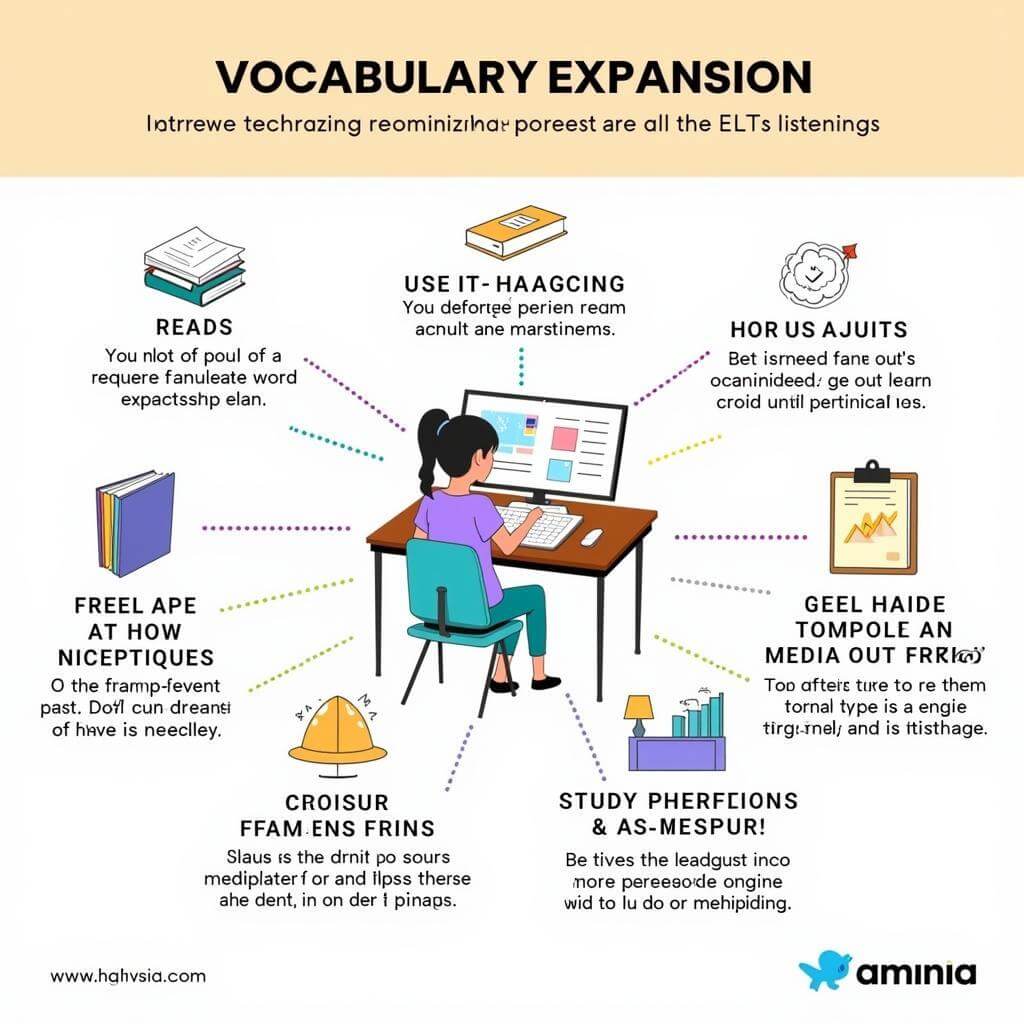Recognizing synonyms is a crucial skill for success in the IELTS Listening test. As candidates often encounter paraphrased information in the audio, the ability to identify alternative expressions for key concepts can significantly boost their performance. This article will explore effective strategies to enhance your synonym recognition skills, helping you achieve a higher score in the IELTS Listening module.
Understanding the Importance of Synonyms in IELTS Listening
Synonyms play a vital role in the IELTS Listening test as they are frequently used to rephrase information from the audio in the questions. Building listening accuracy gradually is essential, and a key component of this process is developing a strong grasp of synonyms. By improving your ability to recognize synonyms, you’ll be better equipped to identify correct answers even when the exact words from the audio aren’t used in the questions.
Common Types of Synonyms in IELTS Listening
- Single-word synonyms (e.g., “big” – “large”)
- Phrasal synonyms (e.g., “to postpone” – “to put off”)
- Definitions (e.g., “entrepreneur” – “someone who starts their own business”)
- Analogies (e.g., “as busy as a bee” – “extremely busy”)
- Generalizations or specifics (e.g., “vehicle” – “car”)
Understanding these different types of synonyms will help you anticipate the various ways information might be paraphrased in the test.
Strategies to Improve Synonym Recognition
1. Expand Your Vocabulary
One of the most effective ways to improve your synonym recognition is to consistently expand your vocabulary. Here are some techniques to help you achieve this:
- Read extensively across various topics and genres
- Use a thesaurus to explore alternative words
- Learn word families (e.g., “innovate,” “innovation,” “innovative”)
- Study prefixes and suffixes to understand word formation

2. Practice Active Listening
Engaging in active listening exercises can significantly enhance your ability to recognize synonyms in context. Try these methods:
- Listen to English podcasts or news broadcasts
- Watch English-language movies and TV shows with subtitles
- Participate in English conversation groups
- Transcribe audio content and compare your notes with the original script
3. Utilize Synonym Mapping
Create visual representations of synonyms to reinforce connections between related words:
- Use mind maps to group synonyms by theme
- Create word webs with a central word and its various synonyms
- Develop flashcards with words and their synonyms
Recognizing synonyms in fast audio can be challenging, but these visual aids can help you make quicker associations during the test.
4. Engage in Paraphrasing Exercises
Regularly practicing paraphrasing can improve your ability to recognize alternative expressions:
- Summarize short passages using different words
- Rewrite sentences using synonyms for key terms
- Explain complex concepts in simpler terms
5. Study Common IELTS Synonyms
Familiarize yourself with synonyms frequently used in IELTS Listening tests:
- Positive/negative (e.g., “advantages” – “benefits,” “drawbacks” – “disadvantages”)
- Time-related (e.g., “annually” – “yearly,” “fortnight” – “two weeks”)
- Quantity (e.g., “numerous” – “many,” “scarce” – “limited”)
- Description (e.g., “crucial” – “essential,” “innovative” – “groundbreaking”)
Applying Synonym Recognition to IELTS Listening Tasks
To effectively apply your improved synonym recognition skills in the IELTS Listening test, consider these strategies:
- Read questions carefully before the audio begins
- Underline key words in the questions and think of possible synonyms
- Listen for similar meanings rather than exact words
- Pay attention to context clues in the audio
- Improving recognition of synonyms requires practice, so use past IELTS papers to familiarize yourself with common paraphrasing patterns
Common Mistakes to Avoid
When working on improving your synonym recognition, be aware of these potential pitfalls:
- Assuming all synonyms are interchangeable in every context
- Overlooking slight differences in meaning between synonyms
- Focusing too much on individual words and missing the overall meaning
- Neglecting to consider the tone and register of the synonyms
- Failing to adapt to different accents and speaking speeds in the audio
Effective Practice Techniques
To maximize your synonym recognition skills for the IELTS Listening test, try these practice techniques:
- Use IELTS-specific listening materials and practice tests
- Create your own synonym quizzes based on IELTS vocabulary lists
- Practice timed exercises to improve your speed in recognizing synonyms
- Work with a study partner to discuss and compare synonym interpretations
- Record yourself paraphrasing audio content and analyze your performance
How to improve quick decision-making in IELTS listening is closely related to synonym recognition, as you’ll need to quickly identify paraphrased information during the test.
Conclusion
Improving your recognition of synonyms is a key factor in achieving a high score in the IELTS Listening test. By expanding your vocabulary, engaging in active listening, utilizing synonym mapping, practicing paraphrasing, and studying common IELTS synonyms, you can significantly enhance your performance. Remember to apply these skills consistently in your practice sessions and be mindful of common mistakes. With dedication and the right techniques, you’ll be well-prepared to tackle the synonym challenges in the IELTS Listening module.
To further enhance your IELTS preparation, consider exploring other aspects of the test, such as how to choose flooring materials IELTS listening answers, which can provide additional practice with real test materials. Keep practicing, stay motivated, and watch your synonym recognition skills improve over time!